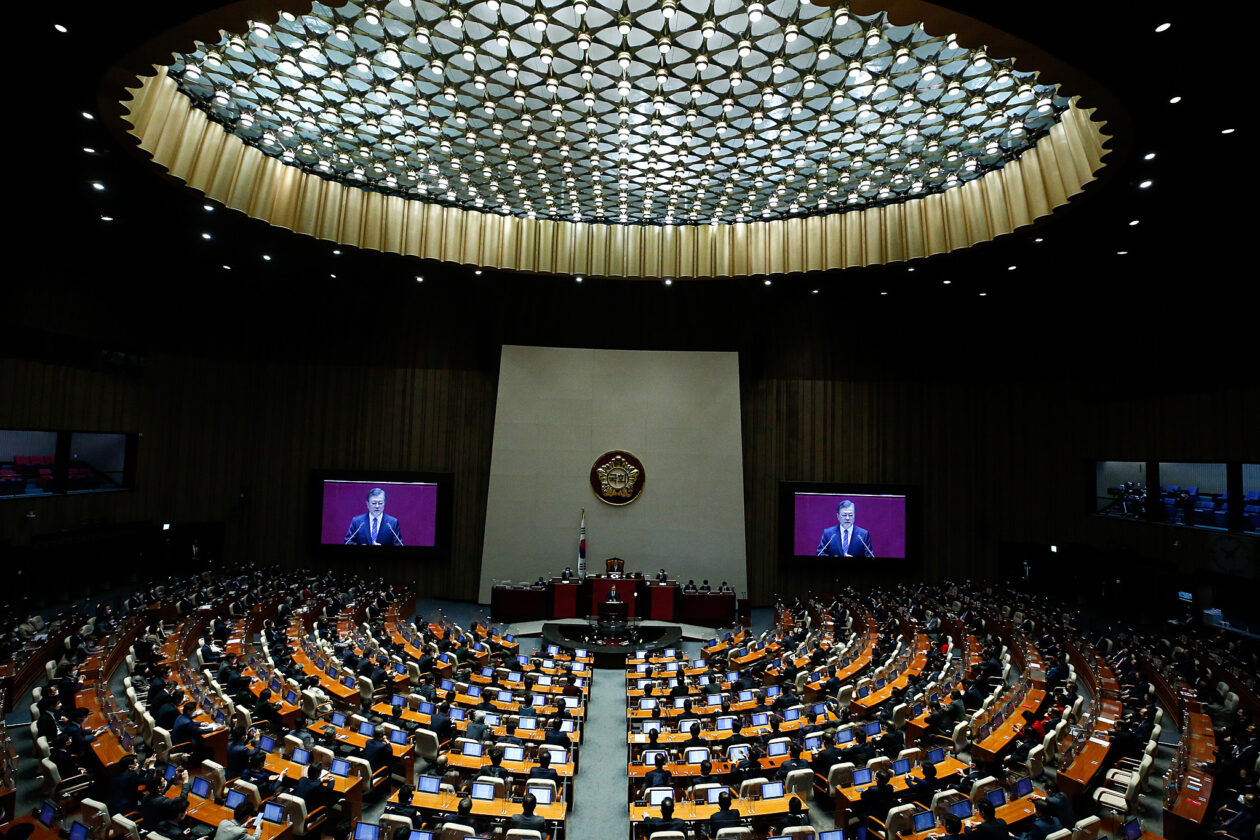South Korea in February 2022 seemed to be in pole position to become East Asia’s leader in metaverse development — defined by the country’s science ministry as an immersive, online, 3D virtual world that enables development of social and economic relations through digital avatars.
In the same year, the government of former president Moon Jae-in announced its Digital New Deal to pour as much as US$46 billion into building out a digital-based economy and creating about 1 million new jobs in the process.
While a relatively small proportion of that, or US$170 million, was earmarked for metaverse investment, the former Information and Communications Technology Minister Lim Hyesook, described the metaverse at the time as “an uncharted digital continent with indefinite potential.”

The technology-obsessed country, one of the world’s biggest on-line game markets and home to global technology giants such as Samsung Electronics Co., did seem to be seeing the bigger picture. The global metaverse industry is projected to have a value of US$142 billion at the end of this year, increasing to more than US$1.5 trillion by the turn of the decade, according to a report from online market data platform Research and Markets in January this year.
Management consultant McKinsey & Co. projected bigger numbers in a survey last year that estimated the economic “impact” of the metaverse as reaching as much as US$5 trillion by 2030, which is about the same size as Japan’s economy.
However the forecasts pan out, South Korea looked on track to be tapping in when Seoul, the capital, in January this year launched “Metaverse Seoul” to offer what it called the world’s first city-backed metaverse providing public services.
Drawbacks
However, South Korea’s metaverse initiatives are built on the current Internet backbone, not the blockchain technology that underpins cryptocurrencies and non-fungible tokens (NFTs).
Those new technologies are regarded by most companies in metaverse development as essential to scaling out these virtual worlds in Web3, or the proposed next evolution of the Internet.
In the end, people will not use the metaverse unless they find it as natural and convenient as real life
Park Hye-jin, Seoul School of Integrated Sciences and Technologies
Also, in the initial burst of metaverse-related excitement in South Korea the public didn’t seem to get the memo, with one government affiliated survey published in April finding that only 4.2% of the population engaged with metaverse services in 2022.
For Park Hye-jin, a specialist in metaverse technology at the Seoul School of Integrated Sciences & Technologies, the South Korean metaverse model has a fatal flaw: the lack of decentralized blockchain technologies like cryptocurrencies, NFTs and decentralized autonomous organizations (DAOs).
“It is blockchain technology that enables the metaverse to embody what we take for granted in real life, such as individual freedom, personal property and participation,” Park said. “In the end, people will not use the metaverse unless they find it as natural and convenient as real life,” she added.
The backers
If South Korea stumbled in the metaverse race in Asia – potentially giving an opening to China and Japan – it still has some heavyweight backers in the country’s technology giants, such as Samsung, LG Electronics, SK Innovation and Hyundai Mobis.
Stars in the K-pop industry followed, while local governments, such as in the Seoul example, began to explore the use of metaverse technologies to provide public services through virtual channels.
However, as Park points out, the involvement of some of the nation’s biggest names failed to win the endorsement of the general public, who may have been attracted by the initial celebrity fanfare, but largely stayed away from locally developed metaverse platforms.
If I can compare this to real estate, the current metaverses are model homes
Noh Ki-tae, CEO of local metaverse startup Fitfuns
As national media chimed in with reports that the metaverse was overblown “hype,” the Metaverse Seoul flagship platform also attracted criticism for a lack of both utility and content. In April, it had 8,212 visitors, while Seoul has a population of over 9.4 million.
Noh Ki-tae, chief executive officer of local metaverse startup Fitfuns that specializes in building platforms for the financial sector, also sees a lot of hype around the industry.
“The government has made a lot of investments [in the metaverse],” said Noh, whose company developed South Korea’s Shinhan Bank metaverse named Shinamon.
“The way I see it, they [the government] weren’t investing in some industry they understand and want to grow, but rather they just thought it would make a good keyword and there’s a lot of buzz around it,” he said, adding companies as a result add the word “metaverse” to business plans to win funds.
Elsewhere, the Zepeto metaverse, built by South Korean internet giant Naver, claims to be the largest metaverse platform in Asia, with monthly active users reaching 20 million in 2022, with endorsements by celebrities like Blackpink and brands like Gucci and Nike.

However, the company said 95% of its users are outside South Korea, suggesting again locals have yet to buy in.
Noh at Fitfuns says the Zepeto metaverse has real banks, convenience stores, and Seoul city office, but you can’t take care of any administrative work in the city office, can’t send any money to your accounts, can’t even buy a bag of chips for your real self in convenience stores.
“If I can compare this to real estate, the current metaverses are model homes,” he said.
Web3 key
Metaverse specialist Park stressed again that for South Korean projects to take off they need to embrace Web3, or the next phase of the internet built around decentralized blockchain technologies and NFTs.
Park argues again that the Web3 generation of digital citizens are focused on issues of ownership, with the right to participate in the governance of a given entity emerging as a key requirement for participation in the metaverse.
This model rejects the so-called “Web 2.0” models based on top-down governance such as in Meta, the former Facebook, founded and led by Mark Zuckerberg. These models face criticism for taking ownership of users’ digital property and activities.

Park cited former U.S. president Donald Trump’s ejection from social media platform Twitter in January 2021 as an example of top-down decision making in the Web 2.0 world.
“When Donald Trump got kicked off Twitter, who really made that decision? I personally don’t like Trump, but why is one small group of individuals making the decision for everyone on Twitter?” Park said.
With decentralized blockchain technologies, such as cryptocurrencies, NFTs and DAOs, Park argues users of the metaverse can claim their digital property rights and collectively establish how their part of the metaverse is run.
Can it happen?
While waiting for the development of a blockchain-based metaverse, South Korea has a number of regulatory hurdles.
Local legislators are still debating whether the metaverse should be classified as a form of online game. Categorization as a game would be detrimental as the country applies strict rules to video games — including an outright ban on those based on blockchain technology.
“Some have argued that game industry laws should be applied, but the metaverse itself is a virtual “society” and should not be viewed as a game in order to control or enable it, said Lee Yoo-bin, chief executive officer of Udaum, which describes itself as a company to make education more enjoyable through metaverse technology.
“Users will join the metaverse when the rules are in place and it is safe, fun, and interactive,” Lee said, adding his company is developing educational content and platforms using augmented reality technology.

Metaverse ethics and behavior is another issue all developers face, as well as in South Korea. Several cases of metaverse sexual abuse against minors have been reported on existing local platforms. The country has drawn up policies on ethical guidelines for metaverse worlds.
Multiple proposals for the promotion and regulation of the metaverse industry are awaiting decisions from the National Assembly, the country’s legislature. But progress is slow and none of the proposed bills made it to the discussion stage during the plenary session last month.
However, there is some optimism that progress could speed up now that regional economic rivals China and Japan are turning their attention to metaverse projects.
Still, Noh at Fitfuns says much work is needed.
“For the metaverse to grow, the platforms need to connect with many companies that are offline and make a virtual economic system that actually works,” he said.
“There needs to be some medium network for everyone, something transparent and decentralized, and that’s blockchain. So blockchain and the metaverse need to go hand-in-hand.”
Park at the Seoul School of Integrated Sciences & Technologies remains optimistic.
“The metaverse is part of an inevitable wave of change called Web3. It’s all about how humans can live more productively, transparently, freely and democratically in the digital world.”






